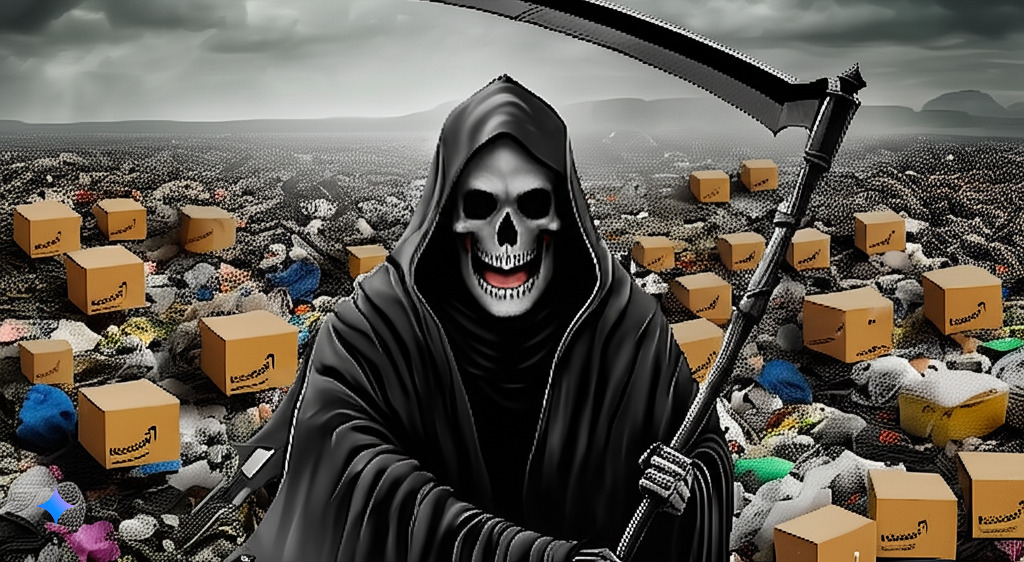The digital landscape is littered with the corpses of once-dominant business models, and the prevailing view that traditional online marketplaces like Amazon are invincible is dangerously naive. I argue that these giants face an imminent demise – not in some distant future, but within the next five years. This isn't mere speculation; it's a prediction driven by the convergence of two unstoppable forces: the unsustainable nature of their current models in the face of a rapidly growing environmental consciousness, and the disruptive potential of Artificial Intelligence in directly connecting buyers and sellers.
The Unbearable Weight of Unsustainability
We've entered an era of conscious consumerism. Shoppers are no longer solely driven by price and convenience; they're demanding transparency, ethical production, and a demonstrable commitment to sustainability. Traditional marketplaces, with their sprawling, often deliberately opaque supply chains, are fundamentally incapable of providing the assurances these consumers now require. This isn't a niche market; it's a tidal wave.
Consider the inherent conflict: these marketplaces are built on a model of maximizing volume and minimizing costs. Sustainability, by its very nature, often demands the opposite: higher production costs, shorter supply chains, and rigorous auditing. Trying to retrofit sustainability onto this existing structure is like trying to turn an oil tanker into a sailboat – it's fundamentally incompatible.
While traditional marketplaces dabble in superficial "green" initiatives, the reality is that ensuring sustainability across millions of products from countless suppliers is an insurmountable challenge. How can they possibly trace the origin of every component, verify ethical labor practices at every factory, and guarantee responsible disposal of every item? They can't. The complexity is simply too great, and the potential for greenwashing is too tempting.
Meanwhile, a new breed of curated, sustainability-focused marketplaces is emerging. Platforms like Green Eco Dream and Shades of Green are thriving precisely because they prioritize ethical sourcing, environmental impact, and transparency. They cater to a growing segment of consumers who are willing to pay a premium for products that align with their values. These platforms are not just selling products; they're selling a story, a commitment, a sense of shared values.
The logistical and packaging nightmares faced by traditional marketplaces further exacerbate this problem. The sheer volume of packaging waste generated by these platforms is staggering, and the carbon footprint of their global shipping networks is immense. Consumers are becoming increasingly aware of these issues, and they're holding these marketplaces accountable. No amount of "carbon offsetting" can fully compensate for a fundamentally unsustainable business model.
The writing is on the wall: consumers are migrating to platforms that reflect their values. Traditional marketplaces, perceived as being driven solely by profit and indifferent to sustainability, will be left behind, burdened by their own unsustainable weight.
The AI-Powered Disintermediation
While the sustainability crisis erodes the moral authority of traditional marketplaces, Artificial Intelligence is delivering the knockout blow by dismantling their very reason for existence: intermediation.
The core value proposition of a traditional marketplace is connecting buyers and sellers. But AI is rapidly becoming far more effective at this task, rendering the traditional marketplace model increasingly obsolete.
AI can personalize recommendations and search results in ways that traditional marketplaces can only dream of. It's no longer just about matching keywords; AI can understand the nuances of consumer needs, preferences, and values. Imagine an AI-powered personal shopping assistant that not only finds the best price on a product but also verifies its ethical sourcing, environmental impact, and alignment with your personal values. This is the power of AI-driven disintermediation.
We're moving towards a future where AI agents directly connect buyers with sellers, bypassing the need for a centralized platform altogether. These agents will be able to consider a far wider range of criteria than any traditional marketplace, including factors like sustainability certifications, ethical labor practices, and even the seller's overall social responsibility.
This shift will empower consumers to find exactly what they need from specific, vetted sellers, without having to wade through the overwhelming and often unsustainable offerings of traditional marketplaces. They'll be able to build direct relationships with brands and sellers, fostering a sense of connection and trust that is simply impossible in the anonymous world of a giant online marketplace.
Furthermore, the combination of blockchain and AI will revolutionize supply chain transparency. Blockchain provides an immutable record of a product's journey from origin to consumer, while AI can analyze this data to verify sustainability credentials and detect any irregularities. This will empower consumers to directly verify the claims of individual sellers, further reducing the need for a marketplace to act as a gatekeeper.
Conclusion
The demise of traditional online marketplaces is not a matter of "if," but "when." The convergence of increasing consumer demand for sustainability and the rise of sophisticated AI is creating a perfect storm that these giants will not be able to weather.
Their inability to effectively address sustainability concerns, coupled with the disruptive power of AI to facilitate direct connections between buyers and sellers, will render the traditional marketplace model redundant within the next five years.
The future of e-commerce is decentralized, value-driven, and powered by intelligent systems. It's a future where consumers are empowered, where transparency reigns supreme, and where businesses are held accountable for their environmental and ethical impact. In this future, the traditional marketplace, with its unsustainable practices and its reliance on being a middleman, will be a relic of the past.
Are traditional marketplaces building their own graveyards by stubbornly ignoring the seismic shifts in consumer values and technological capabilities? They are clinging to a model that is rapidly becoming unsustainable, inefficient, and irrelevant. The clock is ticking, and the five-year extinction is looming large.
